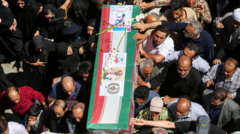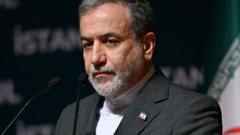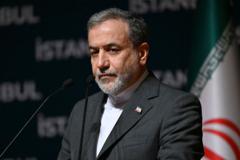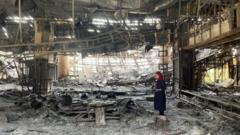**In a recent briefing, Trump emphasized readiness to respond aggressively if Iran enriches uranium to dangerous levels, amidst a backdrop of conflict and ceasefire negotiations.**
**Trump Contemplates Renewed Military Action Against Iran Amid Ongoing Tensions**

**Trump Contemplates Renewed Military Action Against Iran Amid Ongoing Tensions**
**The U.S. President indicates possible future military strikes if Iran's nuclear capabilities pose a threat.**
In a press conference at the White House, U.S. President Donald Trump stated he would "absolutely" consider bombing Iran again if new intelligence indicated that the nation could enrich uranium beyond safe levels. This response came after the United States engaged in military actions against Iranian nuclear sites last weekend, deploying "bunker buster" bombs before Trump quickly sought to negotiate a ceasefire.
Iran's Supreme Leader, Ayatollah Ali Khamenei, dismissed the effectiveness of these strikes earlier this week, asserting that they achieved no significant results. Despite this, Trump continued to assert through various channels, including his Truth Social platform, that Iran's nuclear facilities were effectively "obliterated."
In a recent statement, Trump claimed to know exactly where Khamenei was thought to be hiding during the conflict and suggested he intervened to prevent military forces from targeting the Iranian leader directly. The conflict, which has seen both countries claim victories, also revealed lasting impacts, with Iranian Foreign Minister Abbas Araghchi admitting that the bombings caused "excessive and serious" damage to crucial nuclear infrastructure.
The exchange of hostilities commenced when Israel targeted Iran's nuclear installations, killing key military and scientific figures. Israeli Prime Minister Benjamin Netanyahu warned that, if left unchecked, Iran could develop a nuclear weapon swiftly.
Following the outbreak of hostilities, it was reported that the U.S. White House considered various approaches to lure Iran back to the negotiation table, including the possibility of providing support for civilian nuclear programs that would not involve uranium enrichment. However, Iran firmly rejected these overtures, declaring it would not participate in renewed negotiations despite Trump's announcement of potential talks at a recent NATO summit.
The fallout from the conflict has been devastating, with Iranian health officials reporting approximately 610 fatalities in their country due to the airstrikes, while Israeli reports noted 28 casualties.
Iran's Supreme Leader, Ayatollah Ali Khamenei, dismissed the effectiveness of these strikes earlier this week, asserting that they achieved no significant results. Despite this, Trump continued to assert through various channels, including his Truth Social platform, that Iran's nuclear facilities were effectively "obliterated."
In a recent statement, Trump claimed to know exactly where Khamenei was thought to be hiding during the conflict and suggested he intervened to prevent military forces from targeting the Iranian leader directly. The conflict, which has seen both countries claim victories, also revealed lasting impacts, with Iranian Foreign Minister Abbas Araghchi admitting that the bombings caused "excessive and serious" damage to crucial nuclear infrastructure.
The exchange of hostilities commenced when Israel targeted Iran's nuclear installations, killing key military and scientific figures. Israeli Prime Minister Benjamin Netanyahu warned that, if left unchecked, Iran could develop a nuclear weapon swiftly.
Following the outbreak of hostilities, it was reported that the U.S. White House considered various approaches to lure Iran back to the negotiation table, including the possibility of providing support for civilian nuclear programs that would not involve uranium enrichment. However, Iran firmly rejected these overtures, declaring it would not participate in renewed negotiations despite Trump's announcement of potential talks at a recent NATO summit.
The fallout from the conflict has been devastating, with Iranian health officials reporting approximately 610 fatalities in their country due to the airstrikes, while Israeli reports noted 28 casualties.





















